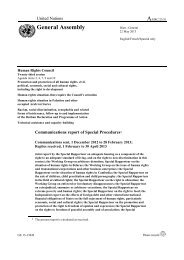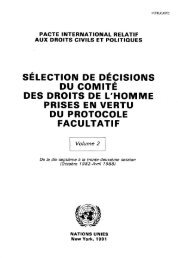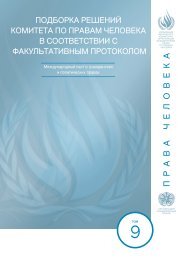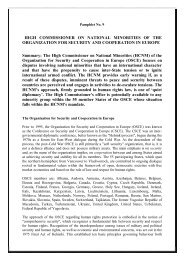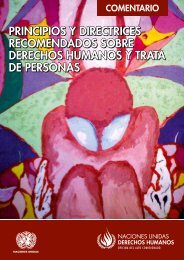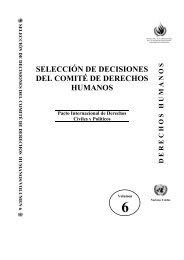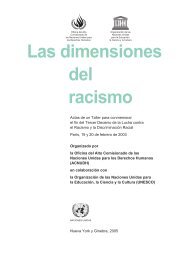good governance practices for the protection of human rights
good governance practices for the protection of human rights
good governance practices for the protection of human rights
Create successful ePaper yourself
Turn your PDF publications into a flip-book with our unique Google optimized e-Paper software.
<strong>of</strong> law conducted by representatives <strong>of</strong> <strong>the</strong> criminal justice system and <strong>the</strong> NGOs<br />
sponsoring <strong>the</strong> programme. The paralegals must have completed secondary education<br />
and be aged 20 to 40. Nearly half <strong>of</strong> <strong>the</strong>m are women. The four NGOs<br />
sponsoring <strong>the</strong> programme coordinate <strong>the</strong>ir work. There is also an advisory<br />
council, which receives regular progress reports and advises <strong>the</strong> paralegals.<br />
Implementation<br />
In its ef<strong>for</strong>ts to streng<strong>the</strong>n <strong>the</strong> capacity <strong>of</strong> <strong>the</strong> justice system and empower<br />
<strong>rights</strong>-holders, PAS engages in a number <strong>of</strong> activities. First, paralegals assist in<br />
<strong>the</strong> processing <strong>of</strong> suspects in police stations. For young <strong>of</strong>fenders <strong>the</strong>y suggest<br />
alternatives to prosecutors in cases <strong>of</strong> first or minor <strong>of</strong>fences or if <strong>the</strong> person<br />
admits fault. In addition to speeding up <strong>the</strong> processing <strong>of</strong> cases, <strong>the</strong> presence <strong>of</strong><br />
PAS paralegals in <strong>the</strong> police stations while juvenile suspects are interviewed is<br />
intended to deter torture and cruel, in<strong>human</strong> and degrading treatment <strong>of</strong> suspects<br />
in police cells.<br />
PAS paralegals also screen prisoners to ensure that those held unlawfully or inappropriately<br />
are brought to <strong>the</strong> attention <strong>of</strong> <strong>the</strong> authorities. The paralegals compile<br />
case lists and refer <strong>the</strong> individual cases to <strong>the</strong> courts or <strong>the</strong> police. They follow<br />
up each individual case until <strong>the</strong> person is released, convicted or sentenced.<br />
Through this work, PAS improves <strong>the</strong> links among <strong>the</strong> various components <strong>of</strong> <strong>the</strong><br />
criminal justice system, and facilitates communication and coordination among<br />
<strong>the</strong> prisons, <strong>the</strong> courts and <strong>the</strong> police.<br />
Second, PAS works to improve <strong>the</strong> legal literacy <strong>of</strong> prisoners through its daily<br />
paralegal aid clinics <strong>for</strong> remand prisoners. The clinics emphasize self-help so that<br />
prisoners learn how to apply <strong>for</strong> bail, make a plea in mitigation, conduct <strong>the</strong>ir<br />
own defence and cross-examine witnesses.<br />
Third, PAS <strong>of</strong>fers legal advice and assistance to remand prisoners who have<br />
overstayed or are being held unlawfully or inappropriately. Priority is given to<br />
vulnerable groups, such as women, mo<strong>the</strong>rs with babies, juveniles, <strong>for</strong>eign nationals,<br />
<strong>the</strong> mentally and terminally ill, and <strong>the</strong> elderly. Paralegals assist prisoners<br />
to fill in standardized bail <strong>for</strong>ms agreed with <strong>the</strong> judiciary, which paralegals <strong>the</strong>n<br />
lodge with <strong>the</strong> appropriate court. Convicted prisoners are assisted in <strong>the</strong>ir appeals<br />
against sentences and in ensuring that sentences passed by <strong>the</strong> lower court<br />
are confirmed by <strong>the</strong> High Court.<br />
Paralegals have also assisted <strong>the</strong> work <strong>of</strong> <strong>the</strong> criminal justice system in o<strong>the</strong>r<br />
ways. They have observed 91 homicide cases and published a report to in<strong>for</strong>m<br />
debate on <strong>the</strong> quality <strong>of</strong> justice delivered. They also called attention to <strong>the</strong> plight<br />
<strong>of</strong> homicide suspects, some <strong>of</strong> whom have been waiting <strong>for</strong> trial <strong>for</strong> 10 years.<br />
By 2005, <strong>the</strong> number <strong>of</strong> paralegals had increased from <strong>the</strong> initial 12 to 37. PAS<br />
had developed a programme in 13 prisons, holding 84 per cent <strong>of</strong> <strong>the</strong> total prison<br />
population, which numbers 8,500 persons.<br />
47



